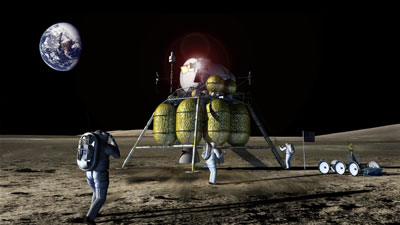Italy: seeking to maintain its political equilibrium in spaceby Taylor Dinerman
|
| Italy is planning to launch a series of “National Autonomous Projects” for lunar exploration, including an orbiter and eventually a rover. |
For Mars they plan to continue to work with the European Space Agency (ESA) on the ExoMars lander and rover. Italy, along with Germany, France, and Britain, have taken lead parts in this project, which they hope to launch in 2011. This activity is taking place within ESA’s Aurora program, along with a potential Mars sample return mission. This program is no longer concentrating on human exploration, though that remains a long-term goal, but on robotic missions which will give the ESA member states an ever greater level of “situational awareness” about the inner solar system.
In contrast to these European programs, Italy is planning to launch a series of “National Autonomous Projects” for lunar exploration. This program includes an orbiter, which may carry some of the instruments that were left off of NASA’s Lunar Reconnaissance Orbiter, and eventually a rover. While ASI may cooperate on these missions with other states, these projects are intended to be Italian-led and Italian-controlled. First of all, there are industrial and technological reasons for this: Italy, like other major European nations, wishes to master the end-to-end process of designing, building, and managing its own space probes.
This is also a way for Italy to stake a claim to being an independent space power. This is an interesting political development since it goes against the prevailing European idea of an “ever-closer union”. Other big European nations, such as France and Germany, have shown that they can maintain independent space programs while at the same time contributing to ESA. Now it seems that Italy is showing the way for mid-sized and possibly even smaller EU member states to seek for themselves the kind of balance that was once reserved for the major EU powers.
The fact that Italy has chosen the Moon as the place to exert an independent effort is also significant. Obviously they are taking into account the NASA plan to return US astronauts to the lunar surface before 2020. Italy, more than any other European nation, has built up a relationship of trust and goodwill with NASA. Notwithstanding the disappointment they must feel about the inability of the shuttle to fly the number of Italian astronauts to the ISS previously agreed to, ASI seems determined to maintain their position as America’s best European friend in space.
There may be more to it than just a desire to maintain a relationship in which they have invested so much. The Moon is going to be the first place that humanity colonizes, and if Italy, as Italy rather than as a part of Europe, is part of that colonization effort, they will be one of the first nations to establish profitable businesses on the Moon and have an outsized influence on global space policy for the next hundred years or more.
The old rules are slowly losing their validity. The treaties that were signed in the 1960s cannot be sustained in the face of future realities. Those nations that have established themselves on the Moon (the US and China perhaps) will write the next set of space laws that will supersede the ones now in effect. Italy hopes to have an independent place at that table. They seem willing, at least for now, to begin investing in the technologies and systems that will earn them an important future role in the governance of the Moon and thus of the Earth-Moon system.
| The Italian government may not have thought through all the implications of their plans, but their instincts seem to be leading them in the direction of a greater national effort on the Moon. |
The management and exploitation of the Moon’s resources will, over the next century, be an important arena of international debate and rivalry. It may be that international organizations such as the UN and EU will become suitable forums for resolving such conflicts, but that is unlikely. Nations that are on the spot with “Moonboots on the Ground”, or their robotic equivalent, will determine the end result, no matter what those who stay on Earth have to say.
The Italian government may not have thought through all the implications of their plans, but their instincts seem to be leading them in the direction of a greater national effort on the Moon. This should be no surprise: Italy is the homeland of Marco Polo and Christopher Columbus. It is also a nation with an acute awareness of the fragility of nations and empires, as for centuries Italy was nothing more than a “geographic expression” fought over by Spaniards, Germans, French, and the occasional Turk or Englishman. Their desire to maintain a balance in their space policy as well as in the other aspects of their foreign policy merely shows that they are being realistic.
